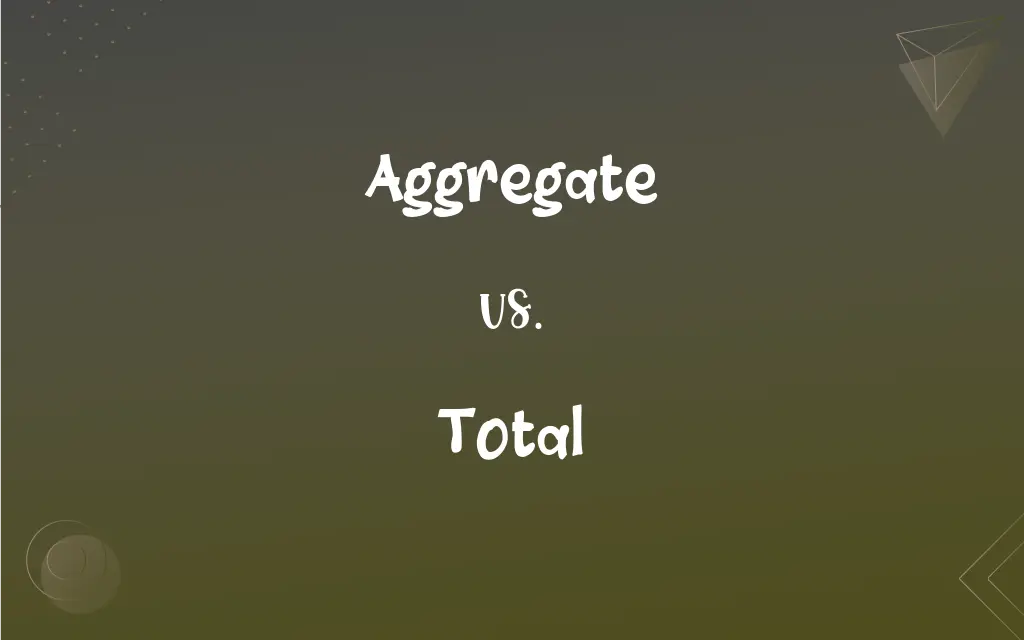Aggregate vs. Total: What's the Difference?
Edited by Harlon Moss || By Janet White || Updated on September 21, 2023
Aggregate refers to the whole formed by combining several elements, while total is the final cumulative sum of individual units or amounts.

Key Differences
Aggregate refers to a collective amount, sum, or mass that is composed of many individual parts. It is a concept used to describe a total amount that is made up of smaller individual units. Total, on the other hand, is a term used to describe the final cumulative sum of individual units or amounts. It is often used to indicate the whole amount of a series of items added together.
While aggregate encompasses the combination of different elements to form a whole, total is more about addition and summation. The concept of aggregate is often associated with the collection and assembly of disparate components to create a comprehensive whole. Total, conversely, is typically related to numerical summation, representing the cumulative amount of added numbers or quantities.
The word aggregate is not solely confined to numeric values; it can also refer to a compilation of various diverse elements. For instance, in construction, aggregate refers to a mixture of materials like sand, gravel, and crushed stone that are combined with cement to make concrete. Total, meanwhile, strictly represents a numeric value that signifies the conclusive sum of a sequence of numbers.
Understanding the nuances between aggregate and total is important in various domains like mathematics, statistics, and economics. Aggregate is more about collection and combination, symbolizing the accumulated sum or mass of different elements. Total signifies the end sum of numerical values, representing the concluding value in arithmetic calculations.
Comparison Chart
Definition
A whole formed by combining several elements.
The final cumulative sum of amounts.
ADVERTISEMENT
Numeric Application
May or may not strictly imply numeric application.
Strictly implies a numeric value.
Use in Construction
Refers to a mixture of materials.
Does not have a specific application.
Contextual Application
Can relate to varied contexts and represent collections.
Primarily represents final sums.
Flexibility
Has diverse application in language.
Has a narrower, more specific application.
Aggregate and Total Definitions
Aggregate
Aggregate can refer to a total amount made up of smaller amounts.
The aggregate of his monthly expenses was higher than expected.
ADVERTISEMENT
Total
Total denotes the sum of a set of numbers or quantities.
The total sum of his earnings was significant.
Aggregate
Constituting or amounting to a whole; total
Aggregate sales in that market.
Total
Total refers to the final cumulative sum of individual amounts.
The total of the invoice was $500.
Aggregate
(Botany) Crowded or massed into a dense cluster.
Total
An amount obtained by addition; a sum.
Aggregate
Composed of a mixture of minerals separable by mechanical means.
Total
The whole amount of something; the entirety
The storm damaged the total of the housing units.
Aggregate
A total considered with reference to its constituent parts; a gross amount
"An empire is the aggregate of many states under one common head" (Edmund Burke).
Total
Of, relating to, or constituting the whole amount; entire
The total population of the city.
Aggregate
The mineral materials, such as sand or stone, used in making concrete.
Total
Complete; utter; absolute
Total concentration.
A total effort.
A total fool.
Aggregate
To gather into a mass, sum, or whole
Aggregated the donations into one bank account.
Total
To determine the total of; add up
They totaled the applications at 600.
Aggregate
To amount to; total
Revenues will aggregate more than one million dollars.
Total
To equal a total of; amount to
The week's receipts totaled more than $90,000.
Aggregate
To collect (content from different sources on the internet) into one webpage or newsreader.
Total
To wreck completely; demolish
The driver survived the crash but totaled the car.
Aggregate
To come together or collect in a mass or whole
"Some [bacteria]aggregate so closely as to mimic a multicellular organism" (Gina Kolata). "The first stars began to form when hydrogen and helium gas left over from the Big Bang aggregated into dense clouds" (Paul Davies).
Total
To add up; amount
It totals to $25.
Aggregate
A mass, assemblage, or sum of particulars; something consisting of elements but considered as a whole.
Total
An amount obtained by the addition of smaller amounts.
A total of £145 was raised by the bring-and-buy stall.
Aggregate
A mass formed by the union of homogeneous particles; – in distinction from a compound, formed by the union of heterogeneous particles.
Total
Sum.
The total of 4, 5 and 6 is 15.
Aggregate
A set collection of objects.
Total
Entire; relating to the whole of something.
The total book is rubbish from start to finish.
The total number of votes cast is 3,270.
Aggregate
(music) The full chromatic scale of twelve equal tempered pitches.
Total
(used as an intensifier) Complete; absolute.
He is a total failure.
Aggregate
(sports) The total score in a set of games between teams or competitors, usually the combination of the home and away scores.
Total
(mathematics) (of a function) Defined on all possible inputs.
The Ackermann function is one of the simplest and earliest examples of a total computable function that is not primitive recursive.
Aggregate
(roofing) Crushed stone, crushed slag or water-worn gravel used for surfacing a built-up roof system.
Total
(transitive) To add up; to calculate the sum of.
When we totalled the takings, we always got a different figure.
Aggregate
Solid particles of low aspect ratio added to a composite material, as distinguished from the matrix and any fibers or reinforcements; especially the gravel and sand added to concrete.
Total
To equal a total of; to amount to.
That totals seven times so far.
Aggregate
(Buddhism) Any of the five attributes that constitute the sentient being.
Total
To demolish; to wreck completely. (from total loss)
Honey, I’m OK, but I’ve totaled the car.
Aggregate
A mechanical mixture of more than one phase.
Total
(intransitive) To amount to; to add up to.
It totals nearly a pound.
Aggregate
Formed by a collection of particulars into a whole mass or sum; collective; combined; added up.
Total
Whole; not divided; entire; full; complete; absolute; as, a total departure from the evidence; a total loss.
Aggregate
Consisting or formed of smaller objects or parts.
Total
The whole; the whole sum or amount; as, these sums added make the grand total of five millions.
Aggregate
Formed into clusters or groups of lobules.
Aggregate glands
Total
To bring to a total; also, to reach as a total; to amount to.
Aggregate
(botany) Composed of several florets within a common involucre, as in the daisy; or of several carpels formed from one flower, as in the raspberry.
Total
To determine the total of (a set of numbers); to add; - often used with up; as, to total up the bill.
Aggregate
Having the several component parts adherent to each other only to such a degree as to be separable by mechanical means.
Total
To damage beyond repair; - used especially of vehicles damaged in an accident; as, he skid on an ice patch and totaled his Mercedes against a tree. From total loss.
Aggregate
United into a common organized mass; said of certain compound animals.
Total
The whole amount
Aggregate
(transitive) To bring together; to collect into a mass or sum.
The aggregated soil.
Total
A quantity obtained by addition
Aggregate
To add or unite (e.g. a person), to an association.
Total
Add up in number or quantity;
The bills amounted to $2,000
The bill came to $2,000
Aggregate
(transitive) To amount in the aggregate to.
There are ten loads, aggregating five hundred bushels.
Total
Determine the sum of;
Add all the people in this town to those of the neighboring town
Aggregate
To bring together; to collect into a mass or sum. "The aggregated soil."
Total
Constituting the full quantity or extent; complete;
An entire town devastated by an earthquake
Gave full attention
A total failure
Aggregate
To add or unite, as, a person, to an association.
It is many times hard to discern to which of the two sorts, the good or the bad, a man ought to be aggregated.
Total
Including everything;
The overall cost
The total amount owed
Aggregate
To amount in the aggregate to; as, ten loads, aggregating five hundred bushels.
Total
Without conditions or limitations;
A total ban
Aggregate
Formed by a collection of particulars into a whole mass or sum; collective.
The aggregate testimony of many hundreds.
Total
Complete in extent or degree and in every particular;
A full game
A total eclipse
A total disaster
Aggregate
Formed into clusters or groups of lobules; as, aggregate glands.
Total
Total can also mean complete or absolute.
The car was a total loss after the accident.
Aggregate
Composed of several florets within a common involucre, as in the daisy; or of several carpels formed from one flower, as in the raspberry.
Total
Total implies the whole or overall amount of something.
The total number of attendees was fifty.
Aggregate
Having the several component parts adherent to each other only to such a degree as to be separable by mechanical means.
Total
Total is the end result of an addition of numbers or quantities.
The total of 5, 10, and 15 is 30.
Aggregate
United into a common organized mass; - said of certain compound animals.
Aggregate
A mass, assemblage, or sum of particulars; as, a house is an aggregate of stone, brick, timber, etc.
Aggregate
A mass formed by the union of homogeneous particles; - in distinction from a compound, formed by the union of heterogeneous particles.
Aggregate
A sum total of many heterogenous things taken together
Aggregate
The whole amount
Aggregate
Amount in the aggregate to
Aggregate
Gather in a mass, sum, or whole
Aggregate
Gathered or tending to gather into a mass or whole;
Aggregate expenses include expenses of all divisions combined for the entire year
The aggregated amount of indebtedness
Aggregate
Formed of separate units in a cluster;
Raspberries are aggregate fruits
Aggregate
Aggregate is a whole formed by combining several elements.
The aggregate of students' scores determined the class average.
Aggregate
In construction, aggregate is a material formed from a loosely compacted mass of fragments or particles.
The concrete mix contains an aggregate of sand, gravel, and cement.
Aggregate
Aggregate can refer to the total sum of goods or services in the economic sector.
The nation’s aggregate income showed a significant increase this year.
Aggregate
Aggregate is a collective mass or sum made up of several distinct elements combined together.
The aggregate of different ingredients created a delightful culinary fusion.
FAQs
What does aggregate mean?
Aggregate refers to the whole formed by combining several elements.
Is total always numeric?
Yes, total typically represents a numeric value, denoting the sum of individual amounts.
Can aggregate be used in construction terminology?
Yes, in construction, aggregate refers to materials like sand and gravel combined with cement to form concrete.
Can total refer to an overall amount?
Yes, total can denote the overall or whole amount of something.
Can the word aggregate be synonymous with the word total?
While they can sometimes be used interchangeably, aggregate often implies a collection of diverse elements, whereas total refers to a final sum.
Does total represent a conclusive value in arithmetic calculations?
Yes, total represents the conclusive value of added numbers or quantities in arithmetic calculations.
Can aggregate refer to non-numeric values?
Yes, aggregate can refer to a collection of diverse elements, not limited to numeric values.
Is aggregate commonly used in economic contexts?
Yes, aggregate is often used to represent the total sum of goods or services in the economic sector.
How is total defined?
Total is defined as the final cumulative sum of individual units or amounts.
Does total represent a whole formed by combination?
No, total represents the final sum of individual amounts, not necessarily implying combination of diverse elements.
Is aggregate always a large amount or sum?
No, aggregate represents a combined whole, but it is not necessarily large.
Can the total imply completeness?
Yes, total can also imply completeness or absoluteness in certain contexts.
Can aggregate be a loosely compacted mass of fragments in construction?
Yes, aggregate in construction is a material formed from a loosely compacted mass of fragments or particles.
Is understanding the difference between aggregate and total essential in various domains?
Yes, understanding the difference is crucial in mathematics, economics, and statistics as aggregate implies combination, and total implies summation.
Does the total strictly represent numeric values?
Yes, total strictly represents a numeric value, indicating the sum of individual amounts.
About Author
Written by
Janet WhiteJanet White has been an esteemed writer and blogger for Difference Wiki. Holding a Master's degree in Science and Medical Journalism from the prestigious Boston University, she has consistently demonstrated her expertise and passion for her field. When she's not immersed in her work, Janet relishes her time exercising, delving into a good book, and cherishing moments with friends and family.
Edited by
Harlon MossHarlon is a seasoned quality moderator and accomplished content writer for Difference Wiki. An alumnus of the prestigious University of California, he earned his degree in Computer Science. Leveraging his academic background, Harlon brings a meticulous and informed perspective to his work, ensuring content accuracy and excellence.































































